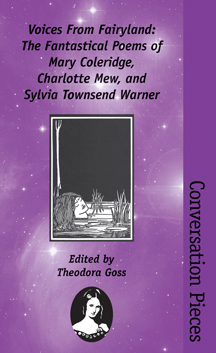

Conversation Pieces | |||
Vol. 20 — Voices From Fairyland: The Fantastical Poems of Mary Coleridge, Charlotte Mew, and Sylvia Townsend Warner | |||
edited by Theodora Goss In Voices in Fairyland, Theodora Goss offers four fascinating essays and several poems in conversation with the poems of Mary Coleridge, Charlotte Mew, and Sylvia Townsend Warner. In her Introduction, Goss writes: Coleridge, Mew, and Warner are only three examples of what I consider a broader phenomenon, the rest of the ice that must be present, underwater, when we see icebergs floating on a northern sea. That underwater ice is the tradition of women writing fantastical poetry. I will show you what I mean by focusing on one theme. Over and over again, women have written about witches. In "Witch-Wife," Edna St. Vincent Millay describes a woman whose "voice is a string of coloured beads, / Or steps leading into the sea" who "was not made for any man," not even the narrator, to whom she is married. The witch in Anne Sexton's "Her Kind" is fiercer and stronger. She tells us,I have found the warm caves in the woods, She creates a domestic space for herself in a place that is decidedly undomestic, that is wild, feeding worms and elves rather than the children that the women who are not witches presumably feed. "A woman like that is misunderstood," Sexton tell us, and we can certainly understand why, if her voice is a string of colored beads or those mysterious steps. She must speak differently, in a language that we cannot quite understand. And here is Emily Dickinson:Witchcraft was hung, in History,
ISBN: 978-1-933500-21-8 (13 digit)
|

